The University of Toronto Students’ Union (UTSU) has partnered with Our Turn, an organization comprised of 20 student unions from across Canada that aims to end campus sexual violence. According to a UTSU press release, Our Turn scored sexual violence policies at all 14 schools, and the University of Toronto’s 2017 Policy on Sexual Violence and Harassment received a 66 out of 100, equivalent to a C letter grade.
The Our Turn National Action Plan, released on October 11 by the Student’s Society of McGill University, contains a detailed scorecard of all 14 schools’ sexual violence policies. Ryerson University scored the highest with an A- letter grade, while Montréal’s Concordia University received the lowest grade with a D-. Schools were graded on the scope, formal and informal complaint process, education and prevention, review committee composition, and “general” aspects of their sexual violence policies.
The tables below detail the scores given to the 2017 U of T Policy on Sexual Harassment.
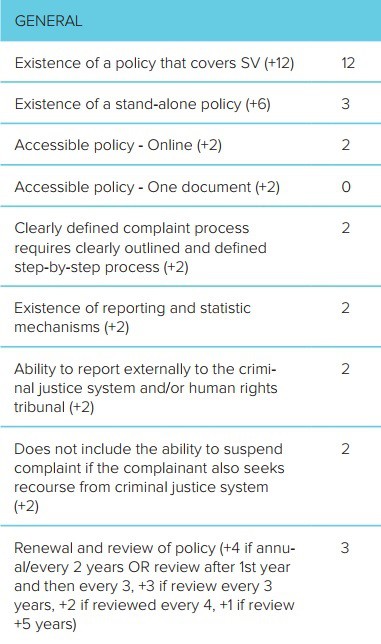
Our Turn, founded by three Carleton students, approached the UTSU about a partnership in May 2017, “and they were super on board from the get-go.” Working with the UTSU, Our Turn graded U of T’s 2017 Policy on Sexual Violence and Harassment, which went into effect on January 1, 2017.
The Ontario government’s Sexual Violence and Harrassment Action Plan Act (Bill 132) requires universities to create “standalone” sexual violence policies, meaning that the policy is not affected by other university legislation. However, Salvino said that there was no clear definition of a standalone sexual violence policy in the bill.
Our Turn does not consider U of T’s policy to be a standalone one and believes it falls under the student code of conduct. “On our part, and on UTSU who made the decision on the score, that’s not what students want. They want a specialized process, because this is a very specific form of violence that can’t really be covered in the same policy as other forms of issues on campus,” explained Salvino.
Terry McQuaid, U of T’s Executive Director for Personal Safety, High Risk and Sexual Violence Prevention and Support, disagreed with Salvino, telling The Varsity that the policy is in fact standalone.
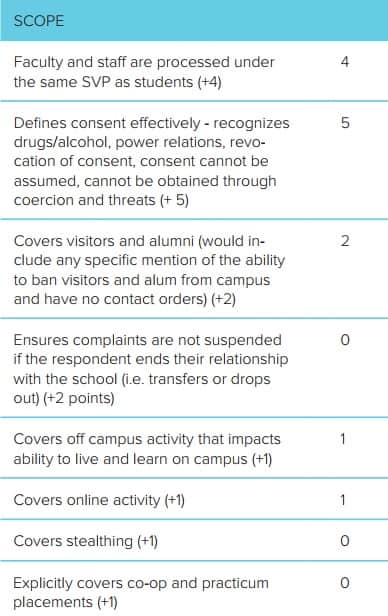
Salvino also mentioned that U of T’s policy makes no mention of “rape culture” on campus, which contributed to the lower score. When asked about whether there was a “rape culture” at U of T, McQuaid would not answer directly, saying, “We know that sexual violence is a broader societal issue, and universities are no different, they’re grappling with this issue as well.”
Chimwemwe Alao, the UTSU’s Vice-President Equity, told The Varsity that there is “100 per cent” a rape culture on campus. He cited the number of experiences shared by survivors, the work of Silence is Violence UofT, and the Trinity College Meeting vote of no confidence, which partially stemmed from the Trinity College administration’s response to a sexual violence complaint.
“It illustrates that there’s a very large rape culture on campus and there’s a lot of work that needs to be done to address that and actually acknowledging that is the first step,” Alao said.
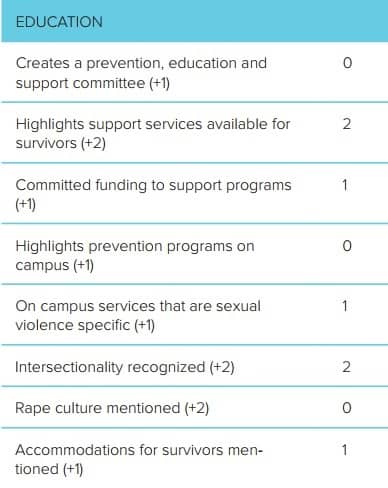
McQuaid said that students were consulted during the creation of the 2017 sexual violence policy. She stated that students were invited to provide online feedback, and that an expert panel visited every campus to meet with students and student groups.
“The methodology behind how [Our Turn has] graded the University of Toronto is not clear,” said McQuaid when asked about the Our Turn evaluation process. “That being said, it is absolutely important to take student’s views into account, and we’re open to hearing from students about the policy, so I don’t see the two things as the same. I can’t speak to the methodology behind the grade, but certainly the university and I are committed to having student’s input.”
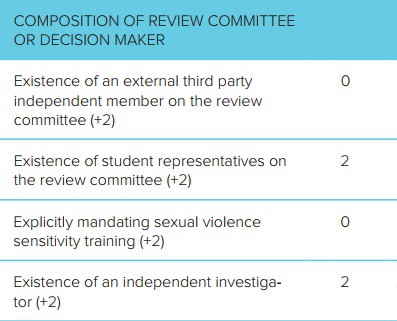
To improve the sexual violence policy, Alao said that he would like to see the university revisit the policy and reopen consultation to take student voices into account. He added that he had heard from students “that there is a severe lack of consultation in the sexual violence policy.”
“A lot of people felt it was performative and just done so that you can have the ‘student consultation’ in it, but there’s a number of students who have had complaints about the inaccessibility of it, the lack of promotion; there’s one or two sessions and then that’s done, and you know, just the lack of being able to access these consultations,” he said.
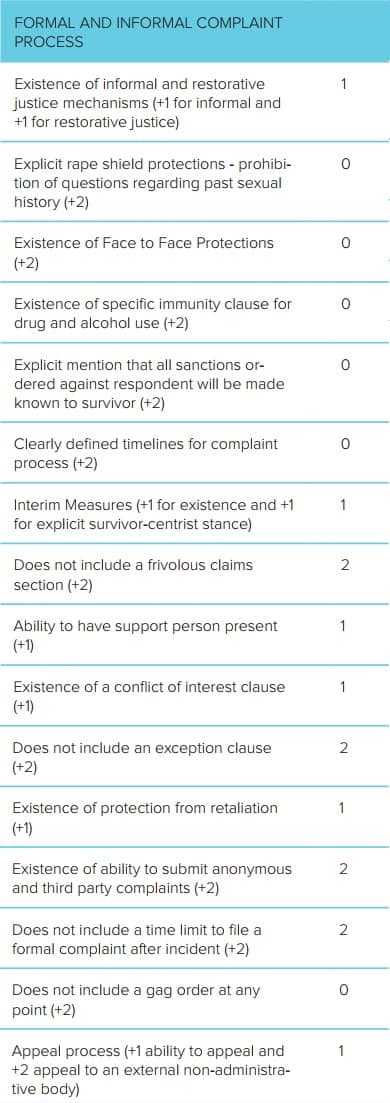
At the most recent UTSU board meeting on October 14, an Our Turn task force was created with the “commitment to taking action to prevent sexual violence, support survivors, and advocate for needed reforms.” The resolution also stipulates that the task force will consult with existing advocacy groups on campus. Alao hopes to use his connection to the university administration in this regard.
“This is a mix of me using my capacity and my links to administration in order to be able to take that mantle for them and help them fulfil their work,” Alao said.
“We pride ourselves in being the best in everything that we do but yet, we’re in the lower middle of the back when it comes to our sexual violence policy,” Alao said. “I think that’s a negative and I think that we can do better in order to be able to improve it.”



